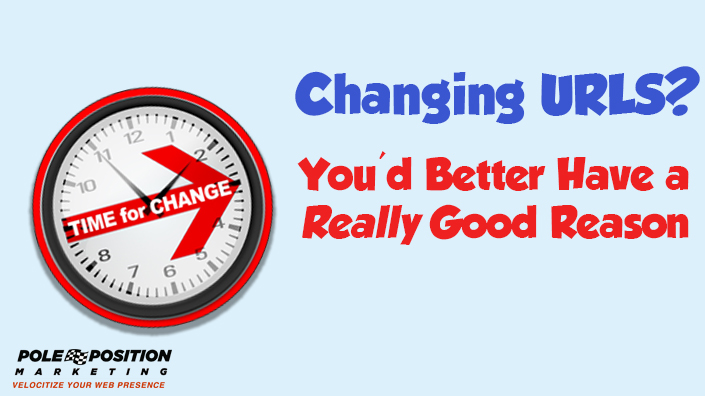For years, SEOs have cautioned businesses against changing their site URLs for “SEO” purposes. Ever since web marketers believed keywords used in URLs carried weight in the algorithm, there was always someone looking to update their URLs to get better rankings. Most SEOs knew that the value gained was usually less than the value lost in making such a change.
But let’s put aside the argument for a minute that keywords in URLs have any impact whatsoever. Instead, let’s just focus on whether or not sites should change or update their URL structure.
Personally, I think it makes sense to use keywords in URLs, but I would never recommend changing URLs for that reason alone. However, if you’re going through a site redevelopment, and URLs will be changing anyway, now is the time to add in sensible keyword usage.
But if you are redesigning the site and there is no compelling need for your URLs to change, it’s best not to.
Ramifications of Changing URLs
When you change the URL for any page on your site, if you don’t implement a proper redirect, every bit of value that page had will be completely lost. Not only that, but visitors who may have bookmarked your page, or sites that have linked to it, will now lead visitors to a page that no longer exists.
Here is where the 301 redirect comes in. Implementing that redirect allows visitors coming to that URL, regardless from an old link, bookmark, etc, will be redirected to the new URL. Essentially, they will land on the correct page, not ever knowing something changed.
That’s the good news.
The bad new is that every 301 redirect causes a small loss of value.
Say for instance that an old URL has a value of 100 “authority” points. I’m making crap up here, but just go with it for a second. When you implement a 301 redirect from that old URL, it is believed that only 85-90% of it is transferred, creating a loss of up to 15% of that page’s authority.
Ok, not a big deal for one page, but it can be a big deal if you’re changing all your URLs across your entire site. Your site just lost 15% of it’s search engine value. That can be the difference between a #1 and a #10 ranking! Even a 5% loss of value can be enough to see rankings drop.
Does that mean you should never change your URLs? No, but don’t do it without carefully considering the ramifications. Sometimes it needs to be done. In those cases the 301 redirect is the right option. A 15% loss is better than 100% loss!
Here’s a hot tip: many sites will only redirect their most recent old URLs to their new URLs. If you make multiple changes in URLs over the years, you have old URLs and really old URLs. Typically, the really old URLs redirect to the old URLs and the old URLs redirect to the new URLs. Each redirect creates a loss in value. Still following?
When you update to new URLs, go back and update all your past redirects so your really old URLs redirect to the new URLs, too. And keep those URLs in place indefinitely. Only when you are sure nobody anywhere links to those old URLs can you remove the redirects completely.

